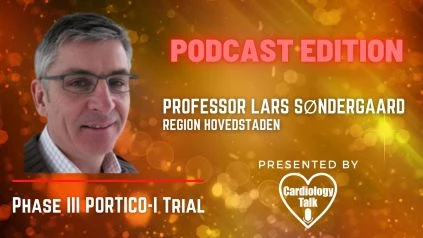Podcast Prof Lars Søndergaard @CopCard @uni_copenhagen #TAVR Phase III PORTICO-I Trial
Professor Lars Søndergaard, Cardiologist at the Region Hovedstaden and Professor at the University of Copenhagen. In this video, he speaks about the Transcatheter Aortic Valve Replacement With a Repositionable Self-Expanding Prosthesis: The PORTICO-I Trial 1-Year Outcomes.
Observation -
Origins:
The innovative self-expanding, repositionable transcatheter heart valve (THV) device was created to treat severe, symptomatic aortic stenosis in patients who are at high surgical risk.
Goals:
The goal of this study was to report on the 1-year results of transcatheter aortic valve replacement with the novel THV system.
Methodologies:
This ongoing international, multicenter trial investigated patients with severe, symptomatic aortic stenosis who were implanted with the THV via transfemoral access and were followed up on at 30 days, one year, and annually for the next five years. The primary goal is 1-year all-cause mortality; supplementary endpoints include adjudicated clinical outcomes and echocardiographic measures.
Outcomes:
A total of 941 patients (82.4 5.9 years old; 65.7 percent female; Society of Thoracic Surgeons Predicted Risk of Operative Mortality score: 5.8 percent) were enrolled and implanted at 61 sites across Europe, Australia, and Canada. Kaplan-Meier estimates for all-cause mortality, cardiovascular mortality, debilitating stroke rates, and myocardial infarction were 12.1 percent, 6.6 percent, 2.2 percent, and 2.5 percent, respectively, at one year. The mean aortic transvalvular gradient was 8.66 mm Hg, and the aortic valve area was 1.75 cm2. In 2.6 percent of individuals with no severe leakage, there was moderate or severe paravalvular leakage. At 30 days and 1 year, new pacemaker rates were 18.7 percent and 21.3 percent, respectively, among pacemaker naive patients. From baseline to one year, functional class, exercise capacity, and quality of life all increased significantly.
Findings:
Transcatheter aortic valve replacement using the new THV is related with low 1-year mortality and stroke rates in individuals at high surgical risk. At one year, hemodynamic findings are favorable, with a modest transvalvular pressure gradient and a low incidence of substantial paravalvular leakage. (5-Year Follow-up of Patients With PORTICO Valves [PORTICO-I]; NCT01802788)



